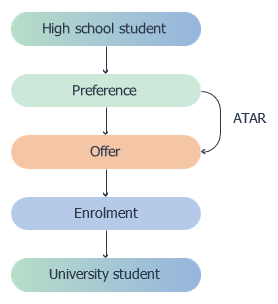Downloads
Economics
Economics is about identifying important problems within society and understanding them. Economics helps explain how decisions are made — how people in households, firms and societies choose to allocate their resources to meet their needs and wants.
- Everyday things
- Human behavior
- Business behavior
- Housing markets
- Labour markets
- Financial markets
- International markets
- Trade‑offs
- Resource allocation
- Productivity
- Incentives
- Risks
- Living standards
- Data
- Statistics
- Theory
- Logic
- Business insights
- Monetary policy
- Government policy
- Health policy
- Environmental policy
- Trade policy
- Development policy
- International policy
- Forecasts
- Models
- Scenarios
- Narratives
- Policy
- General public
- Teachers
- Students
- Media
- Businesses
- Employees
- Politicians
Economist roles
Economists perform economic research and analysis, develop, and apply economic theories to provide advice to governments and organisations on economic policy issues. Economists use data to better understand the performance of the economy and make predictions about the effects of different decisions.
Economists’ insights and recommendations help shape economic policies and initiatives to promote growth, stability, and welfare within the Australian economy.
As an economist in the Australian Public Service, you will have the chance to serve your community by improving the overall well‑being of the Australian society.
Pathway to become an economist
While most universities don’t require any formal subject prerequisites, your high school English and mathematics classes are very important.
Humanities and social sciences subjects are also important for developing useful skills in economics, including problem solving, critical thinking, and understanding our environment and history. You may also attend a high school that offers economics or introductory business studies as an elective and these subjects provide you with a great introduction to the foundational principles of economics.
Typically, you will be required to undertake university level studies in economics, econometrics, commerce, or related fields to become an economist.
Transitioning from High School into a University Course
Economists in the Australian Public Service
Economists in the Australian Public Service do varied work including:
- Conducting research, analysing data, and providing advice on economic policy issues to inform decision‑making processes within government departments and agencies. This includes looking at how policies impact people’s well‑being, education, and training.
- Being involved in macroeconomic analysis, industry analysis, economic forecasting, cost‑benefit analysis, and evaluation of government programs. This entails using important economic indicators to understand what is happening in different industries, regions, and groups of people.
- Analyse and give advice on important economic and social topics, like taxes, prices of goods, the number of people employed or unemployed, the amount we import and export, and how interest rates and currency exchange rates affect our economy.
- Predict and plan for changes in the economy, so that governments, businesses, and individuals can budget, plan for the long term, and make smart investment decisions.
- Develop recommendations, policies, and plans to help improve the economy as a whole, make businesses more successful, and evaluate if projects are feasible and worth pursuing.
- Contribute to policies that address social and welfare issues, with the objective of ensuring social equity and assisting vulnerable groups within the society.
More information
Email Treasury’s Entry Level Program team at entrylevelprograms@treasury.gov.au
